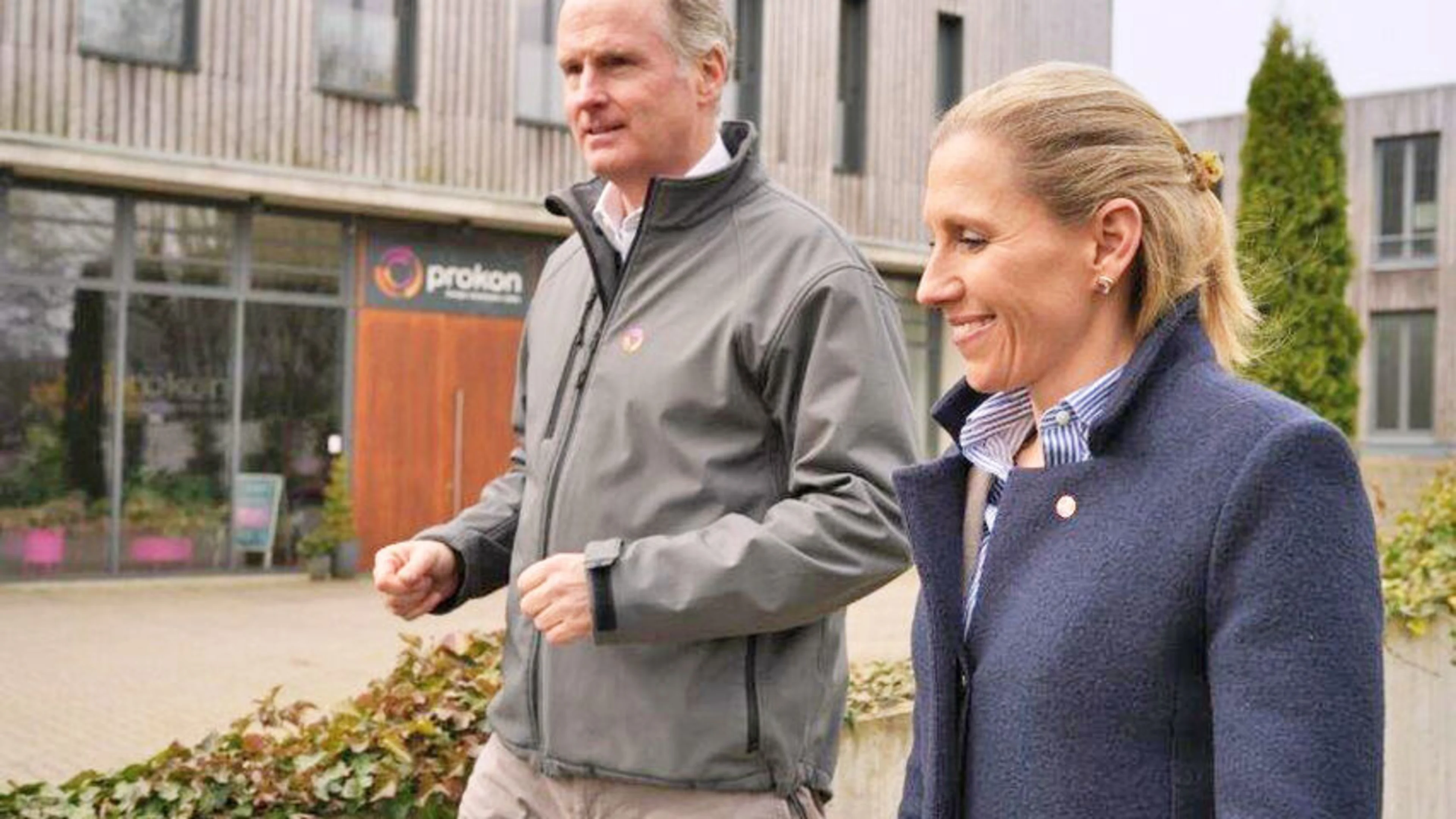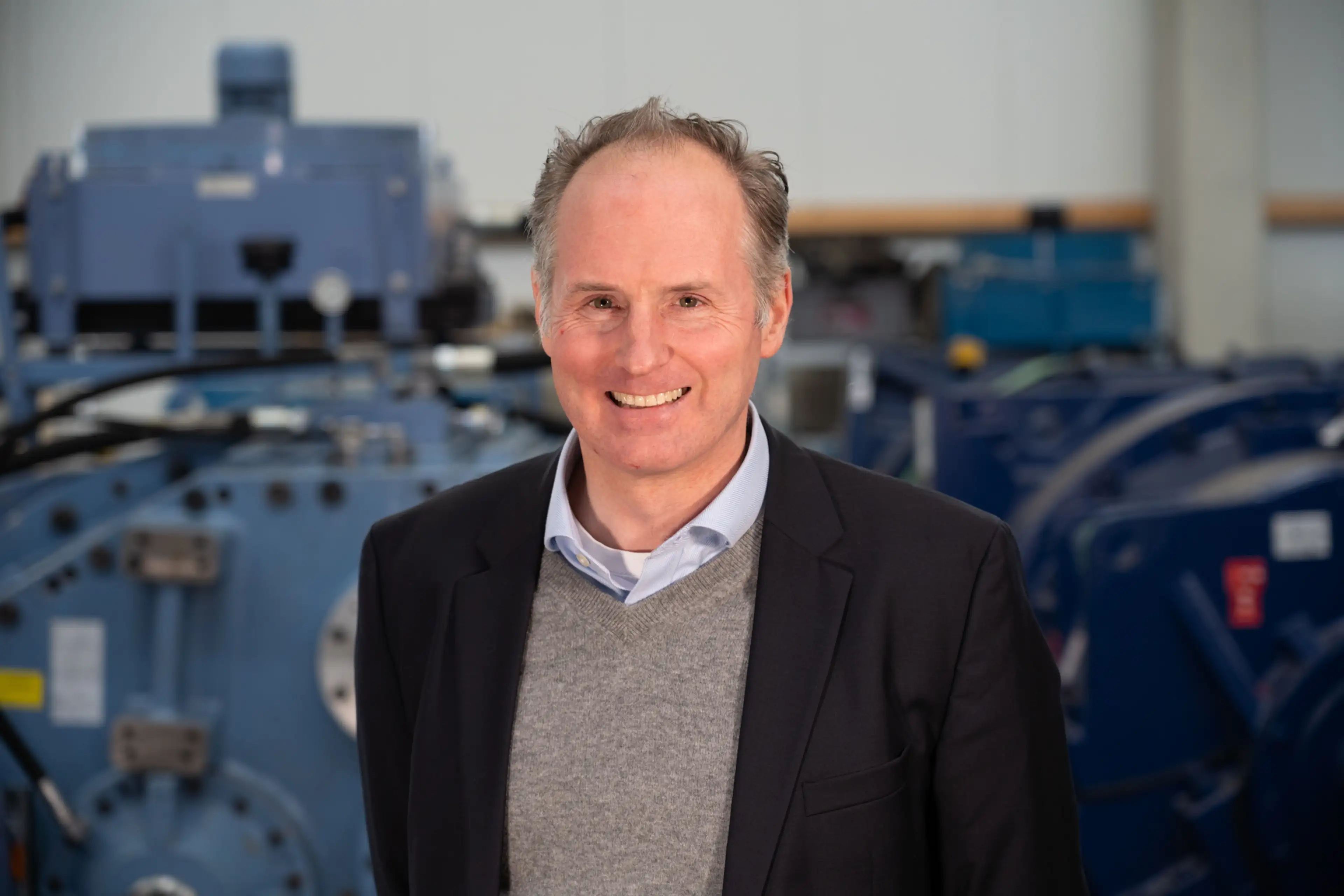
Henning von Stechow and Katharina Beyer are meeting for an interview with the Prokon-Journal. However, during the walk, a dialogue between the two Prokon executives evolves more about member participation, political framework conditions, and the added value of Prokon as an employer.

Henning von Stechow (HvS): In Germany, a cooperative traditionally has two board members. Naturally, we have divided the tasks, but the overall responsibility is always shared by both board members – so we regularly exchange information and also make decisions together.
HvS: I take care of the finances, service, and operation of the wind turbines, company development, energy trading, electricity marketing, and our foreign investments.
Katharina Beyer (KB): My areas of responsibility are project development - from securing the land through permits and construction to commissioning, member care, personnel, and IT with a special focus on digitalisation, process management, and our sustainability strategy - including the sustainability report we will create in the future.
KB: I have considered whether "dream job" is too big of a word: but yes, it simply fits so many things. I have always seen myself more in medium-sized companies and am happy not to work in a corporate structure anymore. I am thrilled with the team I found here: the know-how, the experience, the professionalism, the togetherness. You can feel a completely different energy: here, everyone is eager to pull together and advance the mission of green citizen energy.
Overall, working is more agile because there are not 1000 committees and one can effectively contribute. But of course, the cooperative society structure is new for me and therefore still a learning field.
HvS: From my perspective, the legal form of a cooperative is the ideal model for the idea behind Prokon. After all, it is about transforming the energy generation of an entire national economy. The cooperative participatory offering is an important building block to create acceptance.

Katharina Beyer has been a member of the Executive Board of Prokon eG since 1 January 2024.
She moved from Statkraft Renewables to the Prokon cooperative. There, she was responsible for the Wind Asset Management Germany division. Prior to that, she held senior positions at Siemens Wind Power and Thyssenkrupp Industrial Solutions.
Katharina Beyer, Board Member
HvS: The Cooperative Law has actually regulated this very cleverly: the members' request for information is essentially limited to the general meeting, meaning not every member can demand up-to-date information from the board. However, we generally follow a very participatory approach and make efforts to inform the members regularly through various channels (newsletter, Prokon Journal, etc.) beyond the legal obligation.
KB: This also includes, for example, that we offer the Prokon Dialog three to four times a year, where all members can dial in. During this, everyone has the opportunity to directly contact us and ask questions on specific topics. This way, we receive many ideas from the members. The regional advisory boards also play an important role as a link between the cooperative and the members. Explaining who we are and what we want: the more people understand this, the higher the acceptance, even among citizens. We aim to strengthen the multiplier effect further."
HvS: In terms of acceptance, we have been observing a wave movement for several years, which is also dependent on the political framework conditions. Unfortunately, recent surveys show that local acceptance of the energy transition has somewhat decreased again.
KB: The thinking of "Basically good, but please not in my backyard" is widespread not only on this topic.
HvS: It is all the more important to involve people in the decision-making processes in a timely manner and also to involve them economically. An energy cooperative like Prokon is the perfect answer to this.
KB: My previous experiences confirm this as well: People appreciate that we operate on a cooperative basis. Incidentally, this is also the case with the landowners, who are very important partners for us. The competition for land is intense, but the Prokon approach - that is, not seeking short-term profits, but rather encompassing the entire value chain and not only designing but also retaining and operating the parks - is a real asset.

Dr Henning von Stechow has been a member of the board at Prokon since 2015 and Chairman of the Board since 2021.
The PhD lawyer completed a banking apprenticeship focused on corporate finance before his studies. Prior to joining Prokon, he held a managing position at a mid-sized energy trading company; before that, he managed international clients from the energy sector at a cooperative banking group.
Dr. Henning von Stechow, Chairman of the Board
HvS: Overall, the challenges remain significant. We are not only faced with the demands of landowners. The expansion of the grid is not progressing quickly enough - a topic of paramount importance. We need more focus and speed on that. Both are currently at risk of being lost, as the federal government is giving too much attention to side issues such as Carbon Capture and Storage (CCS). We are fully committed to expanding renewables with all our energy. Whether it's new wind farms or repowering projects with significantly more powerful turbines: We still consider our goal of doubling the amount of electricity generated in our own facilities by 2030 to be realistic.
KB: However, for that we also need the full support of our members. This was strong last year: we were able to raise nearly 25 million euros in fresh capital. The amount was primarily the result of existing members increasing their participatory interests - a huge vote of confidence in the cooperative. In the future, it will be more about convincing even more people to become members of Prokon. To achieve this, we aim to go out more often than before to infect people with our enthusiasm for renewable energy and the special Prokon approach. An example of this is wind farm festivals, of which there are supposed to be two this year.
HvS: We want to showcase our attractiveness to potential new members, as well as potential new employees. The younger generation is said to be particularly interested in linking their careers with a sense of purpose. There is hardly anywhere else where you can find more "purpose" than at Prokon: shaping the energy transition together, with a noticeably higher level of collegiality as offered by a cooperative. Unlike in corporations, at Prokon there is no opposition between employees and shareholders, because the employees themselves can be members and have a say. Of course, we have to operate economically like any other company. But equally important is the shared goal of advancing the energy transition – there is no room for greed and selfishness. KB: Our "New Work" project aims to rebalance how collaboration in today's world works best between in-person and digital interactions. At least two days a week in-person are the foundation for team spirit for us; the combination with home office is important to retain experienced colleagues, as well as to attract new talents and career changers to steer our growth.

HvS: Keyword Growth: 2022 was an excellent year for Prokon - by the way, also compared to our "conventional" competitors. The results impressively demonstrate how successful a cooperative can work. We are now in the "New normal", but our goals are clear: We want to grow dynamically and shape the energy transition as an important player. The focus is on our core business of onshore wind energy in Germany. Our diversification with successful foreign subsidiaries and a strong service division safeguards against market risks. Our task is to use the capital entrusted to us by our members effectively.
KB: We want to further develop Prokon while preserving its strengths as a participative, citizen-focused company. This includes the ambition for as many members as possible to source their green energy from Prokon. Being with Prokon: It should be worthwhile and make employees, members, as well as customers proud.
Mon & Tue: 8:00 – 12:00 and 13:00 – 16:00
Wed: 8:00 – 12:00 (afternoon only written service)
Thu: 13:00 – 18:00 (morning only written service)
Fri: 8:00 – 12:00
Language (Country)
Prokon eG 2024. All rights reserved.